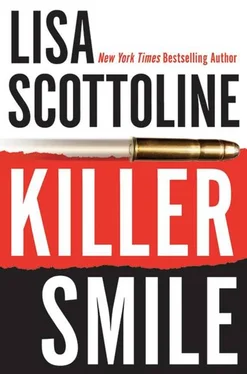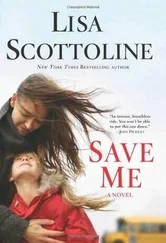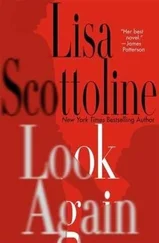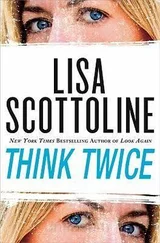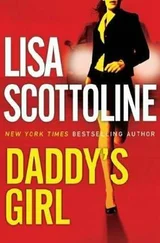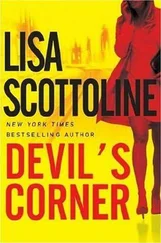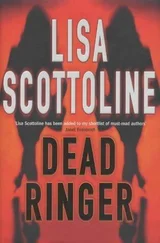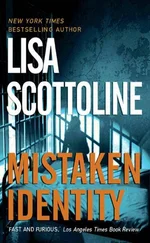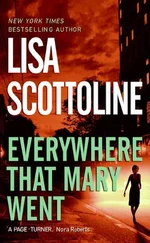“No.”
“Does the name Amadeo Brandolini mean anything to you?”
“No. He on the crew?”
“Not that I know.” Mary let it drop. It was risky to even go there, but she had to ask it. Her disguise was good enough, and it was a safe bet that Matern didn’t remember the details of the newspaper story from days ago. “Now, also for the record, I understand that Mr. Saracone made certain investments with you. Substantial investments, in the neighborhood of twenty million dollars.” Mary was remembering the financial statement in Saracone’s home office. “Twenty million with you, and slightly more with Merrill Lynch. I probably shouldn’t specify how much, exactly.”
“More with Merrill?”
“I can’t confirm.”
Mr. Matern arched a graying eyebrow. “I’m surprised you know all that.”
I am, too. “Don’t be. Melania trusts me completely, Mr. Matern.”
“She never mentioned you.”
“I’m that confidential, and of course, Melania requests that you keep this visit strictly between us. To do otherwise would not only jeopardize the investigation, but it could also make you vulnerable to a defamation suit, should the culprit decide to sue her.”
“Of course.” Mr. Matern sat suddenly upright. The word lawsuit could do that to anyone, even executive vice presidents. Especially executive vice presidents.
“Now, you were discussing the source of the investment funds.”
“The source?”
“Of course, we were discussing Saracone’s investments, and you were saying how it was amassed.”
“No.” Mr. Matern shook his head, puzzled. “I wasn’t saying how it was amassed.”
“Of course not, and you keep getting me off the point.” Mary tried shooting him a stern glance and may have succeeded. If so, it would be the first time in her life. She rose to go, slipping her legal pad back into her purse. “Well, thank you for your time. I do appreciate it, and your discretion.”
“Of course. Please give my best to Melania.”
Ten minutes later, Mary was sitting in front of another mahogany desk in another ritzy office in Center City. Thomas Richter sold home and car insurance, and was a younger version of Mr. Matern, only with blue eyes. Mary went through her spiel and ended with: “And so, how often did you and your wife Lynnie go fishing with the Saracones on the Bella Melania ?”
“At least ten times, I guess.”
“You must be an avid fisherman.”
“No, not at all.” Richter laughed. “I only went along because Giovanni invited us. But we never fished, we just sat around in those little chairs on deck and drank Bloody Marys.”
“Giovanni didn’t fish?”
“Not that I saw.”
Weird . “Thanks for your time,” Mary said, closing her pad to go.
Ten offices later, in a double-checking frenzy, she had met most if not all of Saracone’s guests, all young or middle-aged professionals who had sold him his car, home entertainment system, or stocks; fixed his bridgework, his sundeck, or Porsche Carrera; prepared his taxes, his will, or his pension fund. All of them had been on the Bella Melania with Saracone and had guzzled vodka gimlets, Tanqueray-and-tonics, whisky sours, Manhattans, daiquiris, or Heineken. None of them fished, and all of them confirmed that Saracone didn’t, either. None of them knew him that well. None of them knew the name Brandolini, except for one who swore it was a delicious entrée, with clams and white sauce. None of them went back to the old days. Mary didn’t get it. Somehow, somewhere, somebody had to know Amadeo, or at least fish, or there was no connection to Amadeo at all. And she would be, as they say, dead in the water.
By five-thirty, Mary was standing in front of her last reception desk of the day, facing the final secretary she’d have to barrel through, beg, or sweet-talk.
“Hello, I’m Rikki Broughley,” she began, glancing around the insurance office. “I’m here to see Mr. Jackmann.” It was a one-man law office in an unfashionable part of the city, and the secretary chain-smoked brown Capri cigarettes.
“Mr. Jackmann’s gone for the day.”
“Will he be back? It’s an important matter, on behalf of his friend Melania Saracone.”
“No.” The receptionist belched smoke. “Melania? She the wife?”
“Yes. Giovanni’s wife.”
“Oh, Gio, we know.”
Gio . Giovanni’s nickname. The last time she’d heard it was from Mrs. Nyquist. Melania never used it, Mary realized now. “So Mr. Jackmann goes back, with Gio?”
“Way back.”
“How old a man is he?”
“Almost seventy-five. He’s semi-retired, hardly comes in anymore.”
“If he’s not coming back, can you tell me where he lives?” Mary asked, intrigued. Jackmann would be the oldest on the list. “It’s urgent. Or at least would you mind calling him and asking him to call me?”
“Sorry. He has a cell phone, but he won’t answer it. He can’t be reached today unless you’re the Coast Guard.”
Mary couldn’t believe her ears. “What did you say?”
“He’s fishing.”
Wahoo! “What time does he finish? When is he coming in? Docking, whatever? Better yet, where does he fish from?”
“You want to go to the marina?”
“I have to, it’s my job. It’s that important to him. Money is involved. Major money.”
The secretary’s eyes lit up. “Oh, I see. A will . Did Gio leave him money?”
Yeah, right . “I’m not at liberty to say. Just tell me, where does he come in from fishing? From.” Huh?
The secretary rattled off a marina address, and Mary thanked her and scooted out the door.
The sun was setting on the other side of town, and Penn’s Landing was losing its light. The marina was located on the Delaware River at the eastern border of the city, just off the newly renamed Christopher Columbus Boulevard, tucked behind Dave amp; Busters. Mary wouldn’t have guessed that a marina could be a twenty-minute cab ride from Center City, much less next to a sports bar.
The marina was smallish, with only a few skinny wooden walkways between lots of gleaming white boats, bobbing gently in the murky river. People on the boats were laughing, sporting fresh sunburns, and they looked relaxed even as they busied themselves unpacking things, untying things, and undoing things after a day’s fishing. Mary looked around, not wanting to miss Jackmann coming in, and scanned the names of the moored boats. Donna. Julie. Tiffany ; must be first, second, and third wife’s names. There were bad puns, too: Full of Ship. Sea More. Ocean’s Eleven Grand . And then the one she was looking for, already in: Outta Here . It was a white boat, about twenty feet long, with a matte finish and navy stripes along the side and it flew the American flag. An older man was unloading a spool of white rope off the boat and onto the dock. Jackmann.
Mary hurried down the walkway, pretending she wasn’t a landlubber, and burst through a cyclone fence gate in defiance of the MEMBERS ONLY sign. She waved her hand to get Jackmann’s attention. “Ahoy! Mr. Jackmann!” she called, caught up in the nautical spirit, but he didn’t look up and the effort made her cheek wound throb. Loser . She tried again when she reached the back of his boat. “Mr. Jackmann!” Mary was almost breathless, and he finally raised his head.
Jackmann had a weathered tan that brought out the sea blue of his eyes, and he was tall and still fit, in a white polo shirt, raggedy shorts, and untied sneakers. He sported a bushy beard, a headful of thick, grayish hair, and forearms like Popeye. Hot, for an old salt , Mary thought, then stopped cruising a septuagenarian. “Excuse me, are you Floyd Jackmann?”
Читать дальше
